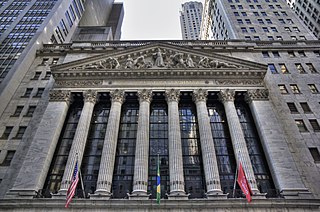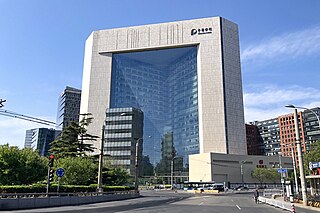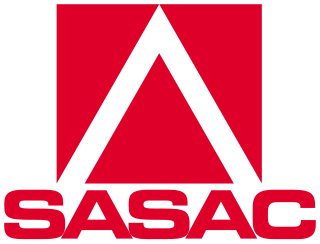
A stock exchange, securities exchange, or bourse is an exchange where stockbrokers and traders can buy and sell securities, such as shares of stock, bonds and other financial instruments. Stock exchanges may also provide facilities for the issue and redemption of such securities and instruments and capital events including the payment of income and dividends. Securities traded on a stock exchange include stock issued by listed companies, unit trusts, derivatives, pooled investment products and bonds. Stock exchanges often function as "continuous auction" markets with buyers and sellers consummating transactions via open outcry at a central location such as the floor of the exchange or by using an electronic system to process financial transactions.

Venture capital (VC) is a form of private equity financing provided by firms or funds to startup, early-stage, and emerging companies, that have been deemed to have high growth potential or that have demonstrated high growth in terms of number of employees, annual revenue, scale of operations, etc. Venture capital firms or funds invest in these early-stage companies in exchange for equity, or an ownership stake. Venture capitalists take on the risk of financing start-ups in the hopes that some of the companies they support will become successful. Because startups face high uncertainty, VC investments have high rates of failure. Start-ups are usually based on an innovative technology or business model and they are often from high technology industries, such as information technology (IT), clean technology or biotechnology.
Seed money, also known as seed funding or seed capital, is a form of securities offering in which an investor puts capital in a startup company in exchange for an equity stake or convertible note stake in the company. The term seed suggests that this is a very early investment, meant to support the business until it can generate cash of its own, or until it is ready for further investments. Seed money options include friends and family funding, seed venture capital funds, angel funding, and crowdfunding.
A joint venture (JV) is a business entity created by two or more parties, generally characterized by shared ownership, shared returns and risks, and shared governance. Companies typically pursue joint ventures for one of four reasons: to access a new market, particularly emerging market; to gain scale efficiencies by combining assets and operations; to share risk for major investments or projects; or to access skills and capabilities.
Funding is the act of providing resources to finance a need, program, or project. While this is usually in the form of money, it can also take the form of effort or time from an organization or company. Generally, this word is used when a firm uses its internal reserves to satisfy its necessity for cash, while the term financing is used when the firm acquires capital from external sources.

Mediobanca is an Italian investment bank founded in 1946 at the initiative of Raffaele Mattioli and Enrico Cuccia to facilitate the post-World War II reconstruction of Italian industry. Cuccia led Mediobanca from 1946 to 1982. Today, it is an international banking group with offices in Milan, Frankfurt, London, Madrid, Luxembourg, New York and Paris.

The State Administration of Foreign Exchange (SAFE) of the People's Republic of China is an administrative agency under the State Council tasked with drafting rules and regulations governing foreign exchange market activities, and managing the state foreign-exchange reserves, which at the end of December 2016 stood at $3.01 trillion for the People's Bank of China. The current director is Zhu Hexin.
China's banking sector had CN¥417 trillion in assets at the end of 2023. The "Big Four" state-owned commercial banks are the Bank of China, the China Construction Bank, the Industrial and Commercial Bank of China, and the Agricultural Bank of China, all of which are among the largest banks in the world as of 2018. Other notable big and also the largest banks in the world are China Merchants Bank and Ping An Bank.

China Investment Corporation (CIC) is a sovereign wealth fund that manages part of China's foreign exchange reserves. China's largest sovereign fund, CIC was established in 2007 with about US$200 billion of assets under management, a number that grew to US$1,200 billion in 2021 and US$1,350 billion in 2023.

The State-owned Assets Supervision and Administration Commission of the State Council (SASAC) is a special commission of the People's Republic of China, directly under the State Council. It was founded in 2003 through the consolidation of various other industry-specific ministries. SASAC is responsible for managing state-owned enterprises (SOEs), including appointing top executives and approving any mergers or sales of stock or assets, as well as drafting laws related to SOEs.
A wholly foreign-owned enterprise is a common investment vehicle for mainland China-based business wherein foreign parties can incorporate a foreign-owned limited liability company. The unique feature of a WFOE is that involvement of a mainland Chinese investor is not required, unlike most other investment vehicles.
Sofinnova is the name shared by two venture capital firms, Sofinnova Partners and Sofinnova Ventures. The name Sofinnova is a contraction of the French, "Société de Financement de l’Innovation" or, Innovation Venture Capital Company. Both firms trace their roots back to Sofinnova SA, an investment institution founded in Paris in 1972. The two firms have raised ~$4B since inception and have generally shared a similar investment strategy of financing projects and ideas in the life sciences and technology sectors. The firms distinguish themselves on the basis of their target geographies, stage of investment, and sectors. They have been independent entities since 1997.
China Beijing Equity Exchange is an equity transaction bourse and platform run by the government of Beijing for mergers, acquisitions and restructuring of state-owned enterprises.

Legend Holdings Corporation (联想控股股份有限公司) is a Chinese investment holding company with interests in finance, real estate, and information technology, and the controlling shareholder of its better-known associate company, the Lenovo Group. Formed by the Chinese Academy of Sciences, Lenovo was originally Legend Computer, until the English name was changed in 2004. Its Chinese name however remains the same, 联想.
Impact investing refers to investments "made into companies, organizations, and funds with the intention to generate a measurable, beneficial social or environmental impact alongside a financial return". At its core, impact investing is about an alignment of an investor's beliefs and values with the allocation of capital to address social and/or environmental issues.
China Beijing International Mining Exchange is an electronic transaction bourse and platform for mineral rights transactions in China. It handles transactions for both State-owned enterprises SOEs as well as transfers of enterprise-owned mineral rights.
Equity crowdfunding is the online offering of private company securities to a group of people for investment and therefore it is a part of the capital markets. Because equity crowdfunding involves investment into a commercial enterprise, it is often subject to securities and financial regulation. Equity crowdfunding is also referred to as crowdinvesting, investment crowdfunding, or crowd equity.
Zhongzhi Capital was founded in 2011 with registered capital of RMB 1bn, it is an asset management company which is headquartered in Beijing. It is registered with the Asset Management Association of China. It is a subsidiary of Zhongzhi Enterprise Group.

Suning Holdings Group Co., Ltd. is a Chinese privately held company. The company shared the same founder Zhang Jindong with the listed company Suning.com, but Suning Holdings was the unlisted portion of Zhang's unincorporated Suning Group. According to All-China Federation of Industry and Commerce, Suning Holdings Group was ranked as the second largest civilian-run enterprise in the Mainland China in 2018.
BHR Partners (Shanghai) Equity Investment Fund Management Co., Ltd. is a Chinese private equity firm. The company was renamed to BHR Partners (Shanghai) Equity Investment Fund Management Co., Ltd. on May 31, 2023. BHR Partners was founded in 2013 by Bohai Industrial Investment Fund Management Co., Ltd., which is controlled by Bank of China Limited whose focus is on mergers and acquisitions, investments, and reforms as part of the country's state-owned enterprises.








